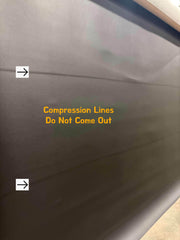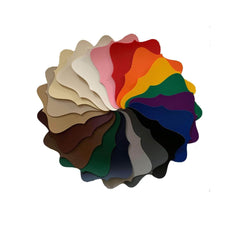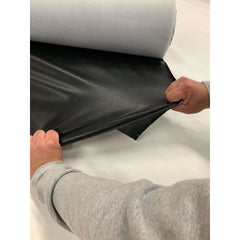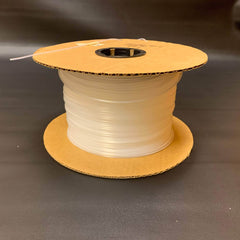
FR vs. Regular Clear Vinyl: When Do You Need Flame-Retardant Protection?
Choosing the right type of clear vinyl can impact more than just cost—it can affect safety, compliance, and performance. If you’re working in a commercial space, public facility, or anywhere near a heat source, flame-retardant (FR) vinyl may be required. For less regulated, low-risk environments, standard clear vinyl often gets the job done without the added cost.
This guide breaks down the key differences between FR and regular clear vinyl to help you decide when flame protection is necessary—and when it’s not.
Quick Takeaways
-
FR vinyl meets fire safety standards like NFPA 701; regular vinyl does not
-
FR vinyl is ideal for commercial, industrial, and public use
-
Standard clear vinyl works well for tents, windows, and marine enclosures and most DIY home projects.
-
FR and standard clear vinyl resists mildew and UV damage, but FR costs more.
What’s the Difference?
Material Composition
-
Regular clear vinyl is a double polished flexible clear plastic that can provide a glass like appearance when installed properly.
-
FR clear vinyl is the same as clear however FR has a fire-resistant additive that slow ignition and reduces flame spread. Complies with most general public space building codes.
Fire Safety Standards
-
FR vinyl meets NFPA 701 requirements, the standard for flame-retardant fabrics in public buildings
-
It can self-extinguish and resist melting or dripping in high-heat environments
-
Regular clear vinyl offers no flame resistance, making it unsuitable for heat-intensive or regulated applications
-
NOTE: It is never safe to have any vinyl, including FR near an ignition source.
When to Use FR Clear Vinyl
Choose flame-retardant vinyl if your project involves:
-
Schools, theaters, churches, or event spaces
-
Factories, warehouses, or industrial tents
-
Marine equipment near engines or heat sources
-
Upholstered furniture, pads, or gym mats in commercial environments
-
Construction zones or job sites with open flames or welding
In many of these cases, compliance with building codes or insurance policies may require flame-retardant materials by law.
When Regular Clear Vinyl Is Enough
Standard vinyl is a great fit when:
-
You’re building tent windows, boating enclosures, porch enclosures, or DIY panels and most everyday use projects.
-
You need maximum visual clarity at a lower cost
-
Fire codes or regulations don’t apply to your setting
Regular vinyl is still UV- and water-resistant, making it a solid option for marine windows, outdoor tents, and patio enclosures.
Pros and Cons: FR vs. Regular Vinyl
|
Feature |
Flame-Retardant Vinyl |
Regular Clear Vinyl |
|
Fire Resistance |
✅ Resist flame |
❌ No additional resistance |
|
UV Protection |
✅ Yes |
✅ Yes |
|
Mildew Resistance |
✅ Excellent |
✅ Yes |
|
Clarity |
✅ Clear |
✅ Maximum clarity |
|
Durability |
✅ Long-lasting outdoors |
✅ Long-lasting outdoors |
|
Weight |
✅ Same |
✅ Same |
|
Wash Resistance |
✅ Retains fire resistance |
❌ Not applicable |
|
Cost |
⚠️ Higher due to added safety |
✅ Lower cost |
|
Use Cases |
Commercial, industrial, public spaces |
Recreational, home, DIY |
Care Tips for FR Vinyl
-
Clean with mild soap and water—avoid harsh chemicals like bleach, ammonia, or pine oils
-
Do not abrade or sand—this can damage the polished surface
-
Rinse thoroughly after exposure to salt or chemicals
-
Store dry and covered, especially in humid or outdoor settings
-
Avoid high-heat drying or open flame near storage areas
Maintaining flame-retardant properties requires gentle cleaning and proper storage.
Final Thoughts
Flame-retardant clear vinyl isn’t always necessary—but when it is, it can protect lives, property, and investments. It’s the right choice for code-compliant buildings, industrial equipment, and public-use spaces. For general DIY projects or outdoor covers far from heat sources, regular clear vinyl offers great value and clarity.
Choose based on your setting, safety needs, and exposure levels. The right vinyl gives you the protection you need—without overpaying for features you don’t.
FAQs
1. What’s the main reason to choose FR vinyl?
It meets fire safety codes and reduces flame spread, making it essential in regulated or high-risk environments.
2. Is FR vinyl required for all public buildings?
Often yes. Many fire codes—especially in schools, theaters, and government buildings—require flame-retardant materials.
3. Does FR vinyl last longer than regular vinyl?
No, the clear vinyl performance is the same.
4. Can I use FR vinyl outside?
Yes, FR vinyl is excellent for outdoor covers, gym pads, and marine use where added fire safety is needed.
5. Is it safe to cut and sew FR vinyl?
Yes, but always follow manufacturer guidelines.








Leave a comment
This site is protected by hCaptcha and the hCaptcha Privacy Policy and Terms of Service apply.